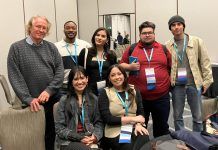Alicia Bailey will turn 24 years old this month but she won’t celebrate her birthday as she once did.
On April 3, 2009, Alicia was driving home in Bonita in the early morning when she fell asleep at the wheel and crashed her car into a tree on Otay Lakes Road.
She sustained a diffused axonal injury, the most devastating and common type of brain injury, as well as injury to her midbrain, which blocks messages from getting through, her mother Vivian said.
After six weeks doctors gave up on her, but Vivian brought her home to care for her, along with her grandfather Mike and younger sister Ashley.
Vivian worked as an oncology nurse at Sharp Chula Vista for nearly 10 years until she left her job to care for her oldest daughter.
“If they can fix the messages that go through her brain, we might get our daughter back,” Vivian said.
Alicia had dreams to change the world and was inspired by the people around her. Her goal was to work for the United Nations or a global health organization to serve the less fortunate.
She graduated summa cum laude from the University of California, Los Angeles, at age 20 and was applying for doctorate programs at elite national universities when her life was put on hold.
Alicia’s family has planned a fundraiser for Nov. 5 to try to raise enough money to send Alicia to a neurologist in New Jersey who is using experimental methods to wake people from long-term comas.
There, doctors use electrical stimulation, magnetic stimulation tests and Parkinson’s tests to raise dopamine levels in her brain.
The treatment would cost $50,000, but could give Alicia the fighting chance she needs.
The Baileys have spent $100,000 in life savings, Mike’s retirement and Alicia’s savings for grad school.
“Within three months it will probably be gone,” Vivian said.
Since the accident, Alicia has progressed beyond expectations.
When the accident happened, doctors didn’t treat Alicia because of her type of injury.
“They declared her brain dead and said she wouldn’t make it through the night,” Vivian said. “By the next day she was breathing with the ventilator on her own.”
A year later doctors said she wouldn’t get any better than she was then.
But Alicia proved them wrong when she began moving the left side of her body, which her mother said shows the brain is functioning and the movement is not just a reflex.
“We have a video of her walking,” Vivian said. “Alicia has shown that there is hope for people after a year.”
Vivian said her daughter has always been outgoing.
“She’s very adventurous,” she said. “She traveled to Europe as an exchange student while she was at UCLA and lived in Germany for six months. She was very much a go-getter.”
Alicia took courses at Southwestern College in 2004 while attending Bonita Vista High.
At Southwestern, she was an award-winning writer and news editor and the recipient of the college’s highest student honor, the Student of Distinction Award.
Southwestern College journalism professor and newspaper advisor Max Branscomb said Alicia was extremely popular and well respected.
“She is charismatic, charming, beautiful, funny and always upbeat,” he said. “She is one of those rare people who can energize a room just by walking in.”
At UCLA Alicia found international development to be her calling.
“She’s always wanted to join the Peace Corps,” Vivian said. “She was very much into women’s health and wanted to help other countries with epidemics.”
Vivian said if Alicia had not gotten into the car accident, she would be almost done with grad school today.
A previous version of this story incorrectly stated Vivian Bailey said her daughter was in a vegetative state. Bailey did not make that comment.
The Star-News regrets the error.
The story also stated Alicia Bailey is in a coma.
In an email to The Star-News after the story was published, Vivian Bailey described her daughter as being in a “minimally conscious state [and] (MCS) is a disorder of consciousness, distinct from coma or the vegetative state in which a patient exhibits deliberate or cognitively mediated, behavior often enough, or consistently enough, for clinicians to be able to distinguish it from entirely unconscious, reflexive responses.”














